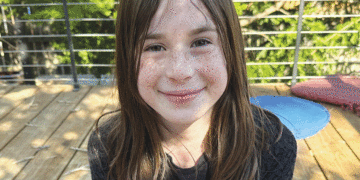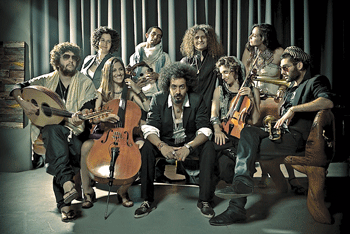Ravid Kahalani and his musical comrades in Yemen Blues meld disparate influences into a compelling smörgåsbord of sounds
By MORDECAI SPECKTOR
Ravid Kahalani, the vocalist for the group Yemen Blues, is from Tel Aviv — and lives part of the year in Finland. I can’t recall ever interviewing any Israelis in Finland, but Kahalani talked to the AJW this week from a town near Helsinki, where he was spending time with his young daughter.
Kahalani is from a Jewish Yemenite family that boasts a long line of renowned singers. He embraces and extends the Yemeni family tradition in his music, and mixes in a range of other musical influences — American blues, funk and jazz, along with North and West African tribal songs.
Two years ago, Kahalani met the talented Israeli jazz bassist Omer Avital. They hit it off musically — “Omer Avital, I thank God every day that I met him,” he says — and then invited other musicians to jam.
The sessions led to the formation of Yemen Blues, a sensational ensemble of virtuosos that will perform 7:30 p.m. Thursday, Jan. 5 at the Cedar Cultural Center in Minneapolis. The concert is presented by the St. Paul JCC.
The lineup for the Cedar show will include, in addition to Kahalani and Avital, percussionists Rony Iwryn and Itamar Doari; Itamar Borochov, trumpet; Rafi Malkiel, trombone; Hilla Epstein, cello; Galia Hai, viola; and Hadar Noiberg, flute. (Trombonist Reut Regev is having a baby, so will stay in Israel, according to Kahalani.)
The eclectic sounds of Yemen Blues are showcased on the group’s eponymous album. On the song “Yoducha,” for example, Kahalani’s impassioned vocals, in Hebrew, ride on the strongly syncopated Arabic-sounding melody. The song is “based on a prayer,” comments the singer; Psalm 67, it seems: “Yoducha amim, Elohim, Yoducha amim kulam — Peoples will praise You, O God; all peoples will praise You.”
“Maybe you know it from the siddur,” says Kahalani, who recites the passage from the Scriptures. “I’m saying that I wish that one day we will all sing in one language and understand each other — and there will be no border between human beings. Everyone can sing to God and, at the end of the day, we all have the same spirit, taking it from the same place and bringing it to the same place. It doesn’t matter who is your God and how you call your God, is something that I talk about in my songs.”
Kahalani says the same sentiment is expressed in the song “Min Kalbi,” a jazzy tune that features the soaring trumpet of Borochov, a Tel Aviv native who has been making his mark on the New York City jazz scene.
On an album that is strong across all 10 of its songs, “Trape la verite” stands out, with its melancholy sound, which Kahalani is surprised to hear compared to Gypsy (Roma) music. The melody came to the singer when he was in a “really calm” mood in Finland.
“Sometimes it’s not fitting to sing in Yemenite Arabic,” he says, regarding the choice of language for “Trape la verite.” Kahalani said a good friend from the Caribbean island of Guadeloupe inspired him to cast the lyrics in French Creole. “Maybe it’s the only sad song of Yemen Blues until today. It’s talking about leaving my love… one sentence is saying that what we are pretending we are, or what we are saying we are, is only a small truth in our actions.”
Kahalani mentions that he enjoys singing in many languages; listeners might not understand the lyrics, but what counts is the “moment of soul,” the ethereal musical connection that transports listeners and imparts a glow after the last note is played.
“It really was magic to work on this album,” Kahalani concludes about Yemen Blues.
The group, which performed 60 concerts in 2011, including major music festivals in the U.S., Canada and Israel, is preparing to record a second album, and Kahalani can’t wait to get back in the studio. And he’s looking forward to the upcoming “mini-tour” of the States, with gigs in New York City, Philadelphia and Minneapolis.
Kahalani became widely known in Israel through his association over recent years with Idan Raichel, another music luminary from the Jewish state who has fused Middle Eastern and African musical genres. (Raichel will perform April 16 at the Dakota Jazz Club, with Malian guitar maestro Vieux Farka Touré.)
Now a trailblazing musician in his own right, Kahalani ticks off a list of American blues greats — Skip James, Blind Willie Johnson, Leadbelly, J.B. Lenoir and Muddy Waters — who inspired him early on.
And he adds some contemporary names.
“I was listening a lot to Prince and Stevie Wonder,” Kahalani comments.
I mention that Prince is from Minneapolis, and some local Jews used to play in his band. Perhaps they can get the word to his Funky Purple Highness about the Yemen Blues gig at the Cedar. Kahalani likes the idea.
But whether or not Prince shows up, Yemen Blues will deliver a live-wire show to kick off the 2012 year in Jewish music.
“We’re excited to be in Minneapolis for the first time,” Kahalani says, and agrees that the upcoming live show will pack a punch — much more so than listening to Yemen Blues on CD.
“It’s really something else. There’s great, great energy on stage and the sound is so much bigger. You know, there’s nothing like live.”
***
The St. Paul JCC will present Yemen Blues in concert 7:30 p.m. Thursday, Jan. 5 at the Cedar Cultural Center, 416 Cedar Ave. S., on the West Bank, Minneapolis. Tickets are $20 in advance, $25 day of show, $5 discount for students; go to: thecedar.org or call 612-338-2674 ext. 2. (Tickets are also available at: the St. Paul JCC, 651-698-0751, and Sabes JCC, 952-381-3499.
Co-sponsors of the Yemen Blues show are the United Jewish Fund and Council of St. Paul, the Israel Center of the Minneapolis Jewish Federation, Sabes JCC, and the Howard B. and Ruth F. Brin Jewish Arts Endowment Fund. Yemen Blues’ appearance is also underwritten by the Herman J. Birnberg Endowment Fund, the Yale Libman Fund, the Tamsky/Pomerantz Fund, and the Dr. Richard Adelson Memorial Fund of the St. Paul JCC Endowment Funds.
The American Jewish World and TC Jewfolk are media sponsors of the concert.
(American Jewish World, 12.23.11)





















Comments 0